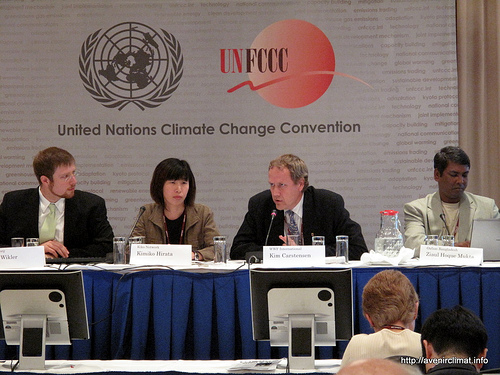I don’t think that NGOs were ever terribly confident about the dedication of countries to stopping climate change, but listening to conversations here at Bonn there seems to be an increasing anger at the determinedly short memories and short-sightedness of developed countries. I am hearing more and more at press conferences, side events and in hallways that developed countries from Japan to the E.U. are failing to really seriously invest in the task at hand; reducing emissions – instead they seem to be trying their best to do as little as possible while getting the most possible credit for their actions. And that’s not even counting the U.S.
By far, the majority of anthropogenic greenhouse gas emissions since the industrial revolution have come from developed countries. Of these countries, the U.S. is by far the worst. A recent World Resources Institute study finds that in the past 150 years, the United States has emitted more greenhouse gas emissions than any other nation in the world, accounting for 29 percent of the world’s total emissions since the mid-1800s.
If the planet’s atmosphere has a lot less space for continued dumping of carbon emissions – and it does – our history of huge cumulative emissions is a big part of the reason why. There’s a strong sentiment that this historical burden for creating the current climate crisis must be considered, and listening to a wide range of developing country representatives from governments, as well as youth, indigenous groups and others here at the Bonn climate negotiations, it’s obvious that stronger U.S. leadership and commitment is still desperately needed to mobilize effective global responses to prevent dangerous global warming.
Despite this, developed countries are not only failing to acknowledge their responsibility to do more to reduce their massive share of world emissions, they are actively seeking loopholes to shirk their responsibility. Japan yesterday announced a target commitment of an 8 percent emission reduction by 2020, only 2 points over their current Kyoto target of 6 percent. The E.U. finance ministers estimated this week that billions of Euros are needed to stop climate change, but here at the negotiations, their team is more concerned with avoiding any accurate accounting of their emissions from forestry and agriculture than actually committing to concrete mitigation or reduction targets. The U.S. is sticking to its Waxman-Markey framework and is actively avoiding any real cuts in coal emissions (our largest source of greenhouse gas emissions) instead attempting to frame our heavy coal usage as a way to finance forest preservation through dodgy offsets.
The need for serious reduction commitments from the top polluting countries is becoming more and more urgent. The UNFCCC Secretariat on Monday estimated that with the current proposed commitments on the table, the world is headed for 4 degrees celsius (7.2 F) of warming – a scary level of climate change at which the world will see a frightening rise in sea level, massive species extinction, drought and even more severe weather events.
We can’t just pass the buck on our responsibility to climate change. Developed countries – especially the US — do need to own up to the fact that we are primarily responsible for climate change. It’s time to start thinking long term and clean up after our own mess. And, this leadership could provide exactly what’s needed to break the gridlock and backsliding countries are in. It just might also create the conditions that developing nations – including China – are saying they need to see to take on their own emissions targets reductions.



